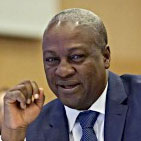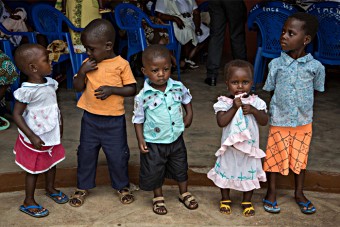
John Mahama
President of the Republic of Ghana
On Africa Day, in celebration of 51 years of African Union, the President of the Republic of Ghana, His Excellency John Dramani Mahama, looks at the changing role of Africa in global development

In 2012 Ghana became the first African country to introduce vaccines against both rotavirus and pneumococcal disease at the same time with GAVI support.
Credit: GAVI/2013/Evelyn Hockstein.
Africa is changing and growing faster than ever, and today, every country on the continent is making efforts to enhance access to new and powerful vaccines, which a decade ago were not available to African children. Due to this access to much-needed vaccines, we are seeing child death-rates fall dramatically and the health of children improving across the continent. The number of children attending school is also increasing steadily as a result of the availability of these vaccines. This development is to be welcomed, but perhaps the biggest change or achievement is the fact that this progress is being achieved largely through African investments.
As African leaders recently gathered in the Nigerian capital, Abuja, for the World Economic Forum on Africa, we were able to take pride in the significant role we – the governments - are playing in this positive transformation. In addition to the billions of dollars we already spend on health services, from 2016 to 2020 African nations will commit more than US$ 700 million directly toward the cost of vaccines for our children, through the GAVI Alliance. Compared to the commitments of GAVI’s largest donors for the current funding period, (from 2011 to 2015), this significant investment would collectively make Africa’s 50-plus nations the fourth biggest investor in GAVI, behind the UK government, the Bill & Melinda Gates Foundation and the government of Norway.
What this means is that we are stepping up to the plate to ensure that our children have access to the best, life-saving interventions and resources, as we strive to achieve self-sufficiency. It also means that we recognise that economic growth has to be built on the foundations of healthy and productive populations, for which the preventative power of vaccines is critical.
In Ghana we are now seeing this first-hand, as we put people first, and continue to embrace vaccination so whole-heartedly in order to keep our people strong and well. In 2012 we, in Ghana, became the first GAVI country to introduce two different vaccines simultaneously, in order to provide protection from pneumonia and diarrhoea - the two biggest killers of children under five. And last year we became one of the first African countries to offer to girls the vaccines that protect them against the human papillomavirus, or HPV, which is the single biggest cause of cervical cancer on the continent. We have also implemented an innovative pilot mHealth project, where mobile phone-based applications notify or remind patients of upcoming appointments and act as an effective interface for health workers to record data and track records.
Just a few years ago it was very difficult for a country like Ghana to have access to such modern vaccines or to be using hi-tech solutions to improve immunisation services. But our partnership with GAVI has changed all that. It has proved that by working together we can achieve more, and indeed since 2000 when GAVI was formed, 440 million more people around the world have received new and additional vaccines. As a direct result the lives of some 6 million have been saved from vaccine preventable disease or death. That is the power of a modern development partnership.
But the job is far from done and we face new challenges every day. One of the biggest of these challenges is how to find ways to reach the ‘hardest to reach’ people. These vulnerable people are no longer only in rural areas. They are also in our cities, and more specifically in low-income and deprived communities, including some in Accra, which is one of the fastest growing metropolises in Africa. Today, as urbanisation gathers pace and more people live in such low-income areas, we will need to identify and use new ways to reach them.
We are determined to reach them. Through GAVI, and the way we maintain a strong sense of ownership by choosing our vaccines and paying for every dose, we should be able to reach everyone who needs the vaccines. We will do so with a sense of increasing ownership. As our economies grow across Africa, so too does our share of the cost of vaccines, until we eventually assume full responsibility for the cost of these life-saving and transformative immunisation programmes. As committed and focused leaders of this dynamic and youthful continent we are determined to ensure that our children grow into a healthy and thriving next generation. We cannot achieve this objective alone, just as foreign aid alone cannot solve the world’s problems. It is only through partnerships such as the one we are keeping with GAVI that we can make significant progress into a sustainable future.
In closing, I wish to pay tribute to the Founding Chair of the GAVI Alliance, our dearly departed colleague, world icon, and predecessor, President Nelson Mandela. It was part of his vision to ensure that the children of Africa have the opportunity of a healthy start to life, so that they can grow and prosper as productive citizens of their respective nations and of the world. Our current achievement and progress are bringing us closer to the realisation of that vision.
This blog was originally posted on the Impatient Optimists website.
